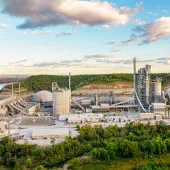Salt X and ABB expand collaboration to decarbonize cement
Salt X electric arc calciner reinvents industrial calcination with renewable electricity and carbon capture
ABB and Sweden-based greentech company Salt X have signed an agreement to enable the further development of technologies in the electric arc calcination (EAC) process. ABB will also become a minority shareholder in Salt X.
The two companies are known for their expertise in electrifying emission-intensive industries, including in the production of cement and quicklime. Today, manufacturers are dependent on fossil fuels for high-temperature heating, up to 900°C, and have no realistic alternative.
Under the new agreement, Salt X will further develop their innovative EAC technology that makes it possible to reach several thousand degrees Celsius. The electric plasma solution is said to reinvent industrial calcination – the process used to heat materials to high temperatures – and replace fossil-driven heating with renewable electricity while capturing the CO2 emissions released.
ABB will contribute with control and electrical systems for the EAC, creating a strong joint offering to the market. The collaboration aims to accelerate the commercialization of Salt X's electrification and carbon separation technology.
‘Salt X gains an optimal industrial partner with extensive experience in scaling up and implementing new industrial technologies on a global scale, together with a substantial capital injection,’ said Carl-Johan Linér, chief executive officer of Salt X.
‘This strengthens us as a company and enables us to progress with our growth plans. With ABB and our other partners, we can significantly improve our capability to take a leading role in the electrification wave sweeping through the industrial sector.’
‘At ABB, we are at the core of accelerating decarbonization in the cement and other emission-intensive industries whilst providing world-class solutions to our customers,’ said Michael Marti, global growth industries business line manager with ABB Process Industries. ‘Our collaboration with Salt X marks a significant milestone in this journey.
‘The technology benefits are twofold, replacing the use of fossil fuels through renewable electricity in the calcination process and enabling cost-efficient capture of the carbon emissions at the same time. It will be a highly effective way of curbing lime production emissions.’
The companies first initiated a collaboration for electrifying the industrial process of calcination in 2022. This intensified in 2023 with the construction of Salt X’s research and test facility (ECRC).










